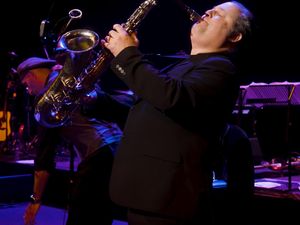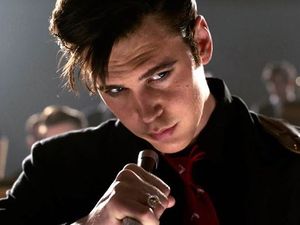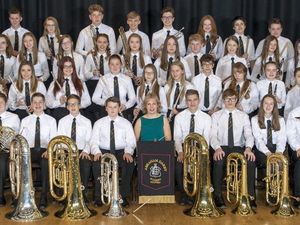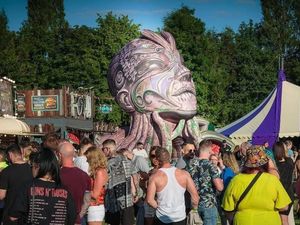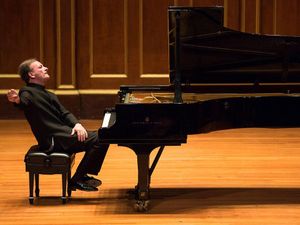Oh what fun they’ve had: Madness talk ahead of Wolverhampton Racecourse show
They’ve been around for 43 years.

And frontman Suggs thinks there’s one simple reason for that: Madness are fun. Surviving the swings and arrows of outrageous fashion, surfing the waves of two-tone and ska, pop and new wave; Madness remain one of the most enduring and popular British bands of all.
They achieved most of their success in the early to mid-1980s and they spent a staggering 214 weeks on the UK singles charts over the course of the decade, holding the record for most weeks spent there by a group in the 1980s.
They’ve enjoyed 15 top ten hits, including One Step Beyond, Baggy Trousers and It Must Be Love as well as the number one UK single House of Fun. Our House was their biggest US hit and in 2000 the band received the Ivor Novello Award from the British Academy of Songwriters, Composers and Authors for Outstanding Song Collection.
Finding poetry in everyday life has been their USP and they’ve written some of the most memorable songs of their era. So how have they kept it going for so many years. And what’s the secret of their enduring popularity?
Frontman, Suggs, thinks there’s a simple answer.
“I think the reason we endure is that we genuinely do enjoy ourselves. From the very beginning you could see the joy in the early videos we made and hear it in the records.
“The fact that we were friends before this band started is key. I genuinely think the whole spark or art of craft and creativity was a by-product of our friendship.
“I think that’s what people feel. It’s a genuine experience. It’s not manufactured. I can’t ever remember being onstage and feeling fed up with the people around me.
“It’s been very flattering and marvellous to see so many different age groups enjoying the band.”
The band are back on the road with a busy summer ahead. They’ll be playing outdoor shows, including a headline at Wolverhampton’s Racecourse at the end of August. “We are looking forward to this on the tour – people of all ages.”
The band’s story began during the heady days of punk. Their pre-Madness incarnation was The North London Invaders, which featured Mike Barson (Monsieur Barso) on keyboards and vocals, Chris Foreman (Chrissy Boy) on guitar and Lee Thompson (Kix) on saxophone and vocals.
Other recruits followed, including John Hasler on drums and Cathal Smyth (better known as Chas Smash) on bass guitar. Later in the year, they were joined by lead vocalist Dikron Tulane. That line-up lasted for a year and then Suggs took over the lead vocals after seeing the band perform in a friend’s garden.
It was far from plain sailing; with so many different characters in the band and the testosterone of youth, things fell apart more than once. Suggs, for instance, was booted out of the band on one occasion for watching too much football and not spending enough time rehearsing with his band mates.
After missing another Saturday rehearsal, so that he could spend time watching Chelsea FC, he was told he couldn’t play with the band any more. It wasn’t the only personnel issue during a chaotic entry into the world of rock’n’roll. The ban didn’t last long, of course, and soon Suggs was back in the band.
The band enjoyed a remarkable run of chart success during the early 1980s, which came to an end during the middle part of the decade. The hits were becoming more and more infrequent and musical differences were arising between band members. In September 1986, the band announced that they were to split and (Waiting For) The Ghost Train was their farewell single, peaking at a not-impressive-by-their-standards number 18.
It wasn’t a happy split and within a couple of years four members of the band – Suggs, Chas Smash, Lee Thompson and Chris Foreman – were continuing under the name The Madness. That incarnation didn’t fare particularly well, however, and after one self-titled album and two singles that failed to make the top 40, the band split.
Remarkably, given all of their achievements during the 1980s, it’s the second half of their career that’s been the more impressive. Their single, It Must Be Love, was re-released in 1991 and gave them a posthumous number 6 hit in the UK singles chart. A singles compilation followed, peaking at number one and prompting the band to return.
A reunion concert, Madstock!, was booked for Finsbury Park, London, on August 8 and 9 of that year with the original line-up reunited, performing together for the first time since Barson left the band in 1984. Over 75,000 fans attended the weekend festival,and the dancing of the crowd caused some nearby tower blocks to shake perceptibly as they resonated with the frequency of the music. A live album followed and Madness were back in business.
The band started booking annual UK Christmas tours and held three more Madstock! festivals; in 1994, 1996 and 1998. These days, they work just as hard. They’re on the road at various intervals throughout the year and work hard to deliver great shows.
“It’s like preparing for war, a war of fun y’know? A war of fun and frolics but, unlike the Romans, we are going to unleash heaven. I have a suspicion that if I didn’t have a few tequila shots before I went onstage I wouldn’t be quite as lubricated in the joints.
“Tequila and orange juice is the secret of keeping those limbs loose!. I suppose our rituals are now so ingrained that I don’t notice what the rest of the band are doing. Traditionally, we don’t tour for months and months – we gave up on America and they probably gave up on us.
“Touring for years on end is what drains the lifeblood out of a lot of acts that I see, so each tour we do we try and make unique – and special. We can change the set-list nightly if we wish, the main thing is to keep it exciting for yourself, that’s the way to ensure the audience is kept excited too.”
It’s not just the hits that have kept the band going, however. Madness have become more than just another heritage band, catering to those who seek to wallow in nostalgia. In 1999, their comeback album Wonderful – their first for 11 years – hit number 17 on the chart while The Dangermen Sessions Vol I followed six years later and peaked at 11. In 2009, the brilliant The Liberty of Norton Folgate went to number five and after enjoying a number 10 hit in 2012 witih Oui Oui, Si Si, Ja Ja, Da Da, the band went back to number 5 in 2016 with their most recent opus, Can’t Touch Us Now.
Suggs was proud of it. “It’s not particularly thematic, I mean we did an album a little while ago called The Liberty of Norton Folgate which was very much a concept album about London. I remember then even our guitarist saying, what do you think the rest of our songs are about? So they are just songs about everyday life.
"The people we see when we are walking up and down the street. The can’t touch us now thing I suppose is a bit tongue-in-cheek really. We got to the point where we can do what we like, we aren’t really in the confines of the music industry anymore.
“You know no one could have seen this coming because right now I am standing out front of this pub where we started nearly 40 years ago and I certainly would not have thought we would still be going at this point so it’s been a miracle in a lot of ways. In the early days of the band we were seen as a bit, not novelty but jokey, and of course we were. We always enjoyed a laugh and we have a good sense of humour but we did put a lot of work into the music as well.”
He’s equally proud of the band’s legacy. Lest we forget, Madness helped to shape the landscape when they emerged during a fantastically exciting period. Alongside other ska and Two Tone bands, they fought racism and made a stand for equality – as well as entertaining fans.
“We are very proud of that but it wasn’t just us when you think of The Specials and other bands like that. We played a festival in London and we got Toots and the Maytals to support us and a lot of old friends came out of the wood work that I haven’t seen for 30 years and it wasn’t to see us. But I thought that was a great privilege to bring some of these artists back to life because some of them were disappearing and they got the credit for what they did.”
The band have had the time to work on their solo projects. In Suggs’ case, he published two books; the August 2009 tomb, Suggs and the City: My Journeys Through Disappearing London, which was partly based on his TV series Disappearing London. In October 2013 he released his autobiography, Suggs: That Close.
“I got to 50 and my kids had all left home and on the morning of my birthday my cat died and a strange sort of feeling of fatalism came over me and I thought it was about time I pieced together my own erratic, rollercoaster of a life.
“So (in my spoken word show) I did a 1.5-hour monologue, funny, sad and I added a few songs in with my mate on the piano. I just told the story, which could have been of any kid, but it was a remarkable story. It was therapeutic because I never knew my dad as lots of people didn’t, especially all around where I grew up and its guess it’s bit like the band because there were very universal stories.
"Everybody has some sort of loss in their lives and all the ups and downs and having kids and all the rest of it. I mean I never knew my dad at all and I didn’t know what happened to him.”
As well as Suggs’ books and the bands solo projects, the Madness musical was also enormously popular. From October 28, 2002 to August 16, 2003, Our House, ran at the Cambridge Theatre in London. Madness played a role in the executive production of the show and Suggs played a role in the production for a period, playing the central character’s father. It won an Olivier Award for best new musical of 2003.
But it’s getting on stage as a band that all of the group’s members enjoy most. And this summer, racecourses will make up the bulk of their itinerary.
Suggs can’t wait: “Racecourses are great. We’ve played a few in the past where there have been a few races and then you get a bit of Madness. It’s an unbeatable combination. I have a few flutters every now and then and have a bit of luck on the horses. I’m not a gambling man generally but I like it when you can see the steam coming out of the horses’ nostrils and that whole thing in front of you.
“I do like it but I’m terrible loser, which has been my saving grace as far as gambling is concerned, as it’s stopped me getting too involved.
“I did wake up with a greyhound in my bed once. We had been to a charity auction at Walthamstow dog track and there was an auction for the greyhound and we won. I came home with a greyhound, which my wife was quite thrilled about. He did alright actually, we called him Nutty Boy and he went on to win quite a few races.
“That was quite a nice time and the nearest I ever got to be an Alex Ferguson-esque race horse owner. Turning up at the track as a dog owner was quite an experience.”
Madness will headline Wolverhampton Racecourse on August 30 and tickets are available from the venue or at www.wolverhampton-racecourse.co.uk.

